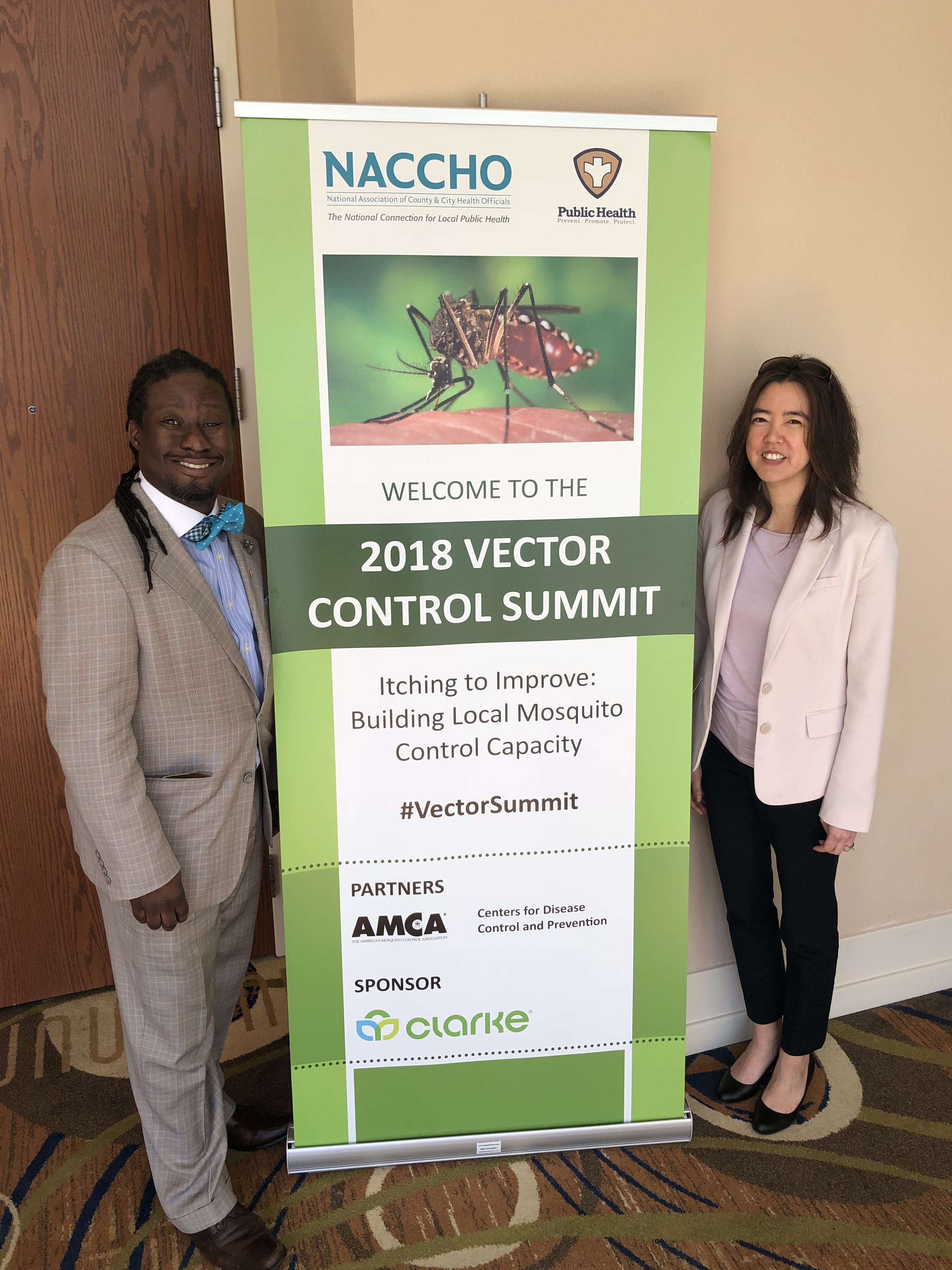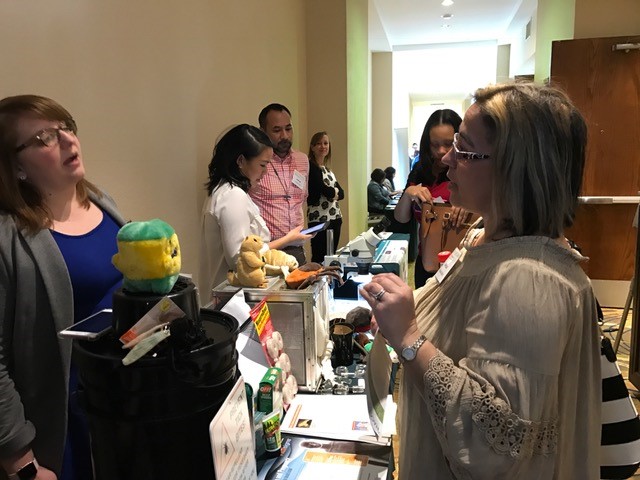In partnership with the Centers for Disease Control and Prevention (CDC), NACCHO developed and distributed an electronic survey to assess mosquito surveillance and control capacity among the nearly 2,000 local vector control programs nationwide. Through this work, we found that although mosquito-borne diseases are an ongoing public  health concern in the United States, a large majority (84%) of local vector control programs are in need of improvement in one of ten competency areas. To bridge this gap, NACCHO hosted the 2018 Vector Control Summit: “Itching to Improve: Building Local Mosquito Control Capacity” from March 13-15, 2018, in Orlando, Florida.
health concern in the United States, a large majority (84%) of local vector control programs are in need of improvement in one of ten competency areas. To bridge this gap, NACCHO hosted the 2018 Vector Control Summit: “Itching to Improve: Building Local Mosquito Control Capacity” from March 13-15, 2018, in Orlando, Florida.
The event convened local health departments, mosquito abatement districts, public works departments, and mosquito control experts with the purpose of providing: technical assistance to local vector programs and partner organizations that are focused on Zika response efforts and/or serve populations affected by Zika; opportunities to exchange successes and challenges shared by local vector control organizations; and forums for education and networking. The Vector Control Summit supported 29 individuals from low-resource jurisdictions to attend this unique training and education opportunity.
With a focus on integrated mosquito management, pesticide resistance testing, and licensing and ordinances, the Summit reviewed best practices and strategies that can be implemented at the local level and provided hands-on training from the American Mosquito Control Association (AMCA) to help attendees apply these principles in their day-to-day work.
Focus Area 1: Integrated Mosquito Management
Based on an understanding of mosquito biology, the mosquito life cycle, and the way mosquitoes spread disease, integrated mosquito management (IMM) uses a combination of methods to prevent and control mosquitoes that spread viruses like Zika, dengue, and West Nile Virus. To explore this further, the Summit featured expert-led panels on putting IMM into practice. Some of the activities discussed included conducting routine surveillance through standardized trapping and identification, using surveillance data to make treatment decisions, and larviciding and adulticiding. There was also an emphasis on leveraging stakeholders to support IMM; for example, integrating communicable disease control programs into the approach and encouraging community-based participatory surveillance. In addition, speakers underscored the importance of outreach and education campaigns for both the general public and other local government agencies.
“Outreach and education are important parts of an integrated mosquito management program because a well-informed public will help you spread your message within their communities by promoting it to friends and neighbors. It’s important that the public knows and understands why we do what we do,” said Lauren Lochstampfor, Environmental Health Specialist at the Fairfax County Health Department in Virginia. “It’s also important to educate internal stakeholders such as stormwater management or code compliance since they see issues on a daily basis that can contribute to mosquito problems and, in their daily dealings, can in turn teach residents how to combat those problems.”
These conversations reinforced that mosquito management isn’t just about one specific technique; rather, it requires a holistic approach that considers factors that influence pest trends, anticipates the effects of control methods, and is based in transparency to build community trust.
Focus Area 2: Pesticide Resistance Testing
For many local health departments, pesticides are an important part of mosquito control. But over time and through repeated use, pesticide resistance – which can be product-specific or develop in response to a certain class of product – may occur in mosquito populations and reduce the ability of the product to kill mosquitoes. Pesticide resistance testing (PRT) is a great way to monitor resistance in mosquito populations, yet many jurisdictions completely lack this capability.
To bolster resistance management skills among local vector programs, the Summit:
- Explored the mechanisms of resistance that local health departments and mosquito control districts must be familiar with;
- Provided a hands-on demonstration of and best practices for how to use a bottle bioassay kit to test for pesticide resistance; and
- Used case studies from the AMCA Best Practices Manual to deliver a training in which participants discussed the mechanism of resistance in their hypothetical communities and decided how to respond based on other factors in the scenario (e.g., resources).
Through these exercises, attendees learned recommended strategies for preventing resistance, including reducing dependence on pesticides, alternating the class of pesticide used, treating only when absolutely necessary, and monitoring control efficacy and resistance development. The training proved particularly beneficial in demystifying PRT and increasing participant confidence and self-efficacy in conducting this work.
Focus Area 3: Public Health Law and Mosquito Control
Across the nation, states’ authority to regulate public health issues, such as general laws regarding pesticide use for mosquito control purposes, helps advance local solutions to local challenges. However, these laws may not be specific to situational scenarios (e.g., outbreak events, aerial application, proximity to childcare facilities). Consequently, vector programs have to determine what level of government – whether it’s state, tribal, local or the independent mosquito control district – has the authority. This task becomes even more difficult in cross-jurisdictional contexts; for example, if there is federal land in a local jurisdiction and the laws differ. So, what can local vector programs do?
Coordinate, educate, and collaborate!
At a minimum, local law should be more restrictive than state law. Vector programs must understand their legal authority and where it’s derived from, apply that authority appropriately by not over- or under-stepping boundaries, and coordinate with other government entities to identify how their authorities intersect. Vector programs should also get to know their legal counsel and their preferences for building cases and enforcing compliance. In addition, it’s vital to educate and then regulate. You can’t regulate into 100% compliance, rather you have to ensure stakeholders are well-informed first. Finally, local vector programs have to get upstream. Collaborate with code enforcement departments to inform development standards processes and identify substandard structures, explore your organization’s authority to apply citations and fines, and know your right of entry.
Looking Ahead: Moving the Needle on Local Mosquito Management
As the Summit closed, participants left with a wealth of new information and a renewed outlook on mosquito management. Delbert Bryant, Sanitation Manager for the City of Greenville, North Carolina, applauded the Summit’s ability to “reach across all levels of mosquito control; not just the aspect of how programs are funded, but also from various educational standpoints, even with the new developments such as genetically modified mosquitos.”
Despite heading back to their jurisdictions with new knowledge and tools, local vector programs must still contend with overcoming funding challenges to improve mosquito control. But, as was a theme throughout the Summit, this challenge can be at least partially surmounted through coordination and collaboration.
“Health departments can consider using volunteers and collaborations with other agencies to increase capacity to manage mosquitoes in their communities,” said Roxanne Connelly, PhD, Chief Entomologist, Division of Vector-Borne Diseases, CDC. In particular, Connelly suggested that local health departments should aim to:
- Engage with faculty at local universities and community colleges that have entomology, biology, or public health programs of study. Schools can often provide a steady stream of students to collect mosquito surveillance data that is useful to guide the local mosquito management program, and it provides the student with data for research projects.
- Communicate and collaborate with nearby mosquito control agencies regularly. Inquire about possibilities of expanding surveillance programs into a region or sharing data that might be helpful to alert the health department about increasing risks of mosquito-borne disease transmission in the region.
- Contact County Cooperative Extension agents to discuss projects that could determine the local distribution and abundance of mosquitoes in the area. The extension offices’ Master Gardner programs can sometimes provide volunteers to help with mosquito surveys.
- Consider working with AmeriCorps. Inquire about their volunteer and service programs and discuss ideas on community campaigns involving mosquito issues.
Local health departments interested in developing or improving their own mosquito control and surveillance program are encouraged to apply for technical assistance from NACCHO. Each consultation will investigate the gaps and attributes of a specific program, with a summary report provided containing next steps and tailored resources. Visit the main Vector Control Webpage to apply by April 30, 2018.
NACCHO thanks all of the participants, speakers, and trainers who attended the Summit, as well as our sponsor, Clarke, and looks forward to continue supporting our members in building mosquito control capacity. To access presentations and resources from the event, visit the 2018 Vector Control Summit webpage. For more information about NACCHO’s vector control activities, email the Environmental Health Team.






